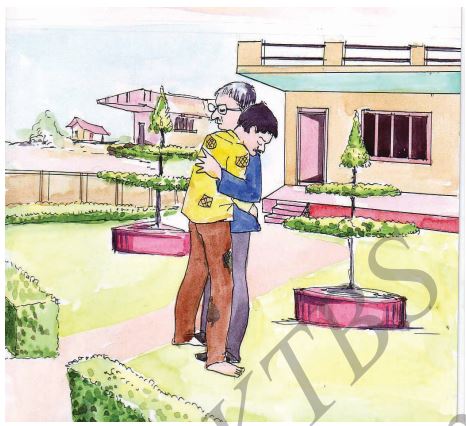WEALTH AND VALUES – Unit-8
Wealth and Values – A Play
Here is the story of a rich businessman Mr. Balaji and his sons Gagan and Rahul. Gagan always helped his father and was a very responsible boy. But Rahul was very irresponsible, always enjoying his time with his friends.
Scene-1
Mr. Balaji’s Palatial house
Rahul : Father, give me my portion of the property. 1
Mr. Balaji: Oh dear! What makes you ask for a share in the property? 2
Gagan : Why Rahul ? Why do you want your share? 3
Aren’t we happy together? 4
palatial : like a palace / ಅರಮನೆಯಂತೆ
Rahul : No! Gagan, I need my share. I want to visit places all over the world; I do not want to explain things to everybody. I want to be independent and happy. I am asking for my share and not your advice. 5
[Rahul collects the money and goes away. He wastes his money spending lavishly and leads a luxurious and wasteful life. He visits places all over the world with his friends. Eventually he turns into a poor man. He begins to feel the need for money again. His friends do not want to be with him. Rahul goes in search of them, but no one helps him. He wanders about desperately and lives in utter poverty. Gradually Rahul realizes that even the servants enjoy better facilities in his father’s house. He decides to go back home. He is advised by his father’s friends to go back to his father. Rahul goes back to his father. His father sees him coming. He embraces him joyfully and takes him home.]
lavishly – extravagant / too much / ಅದ್ದೂರಿಯಾಗಿ
eventually – in the end / ಅಂತಿಮವಾಗಿ
gradually – slowly / ಕ್ರಮೇಣವಾಗಿ
desperately – out of control / do anything to change the situation / ತನ್ಮೂಲಕ
embraced – put hands around to show happiness / hug / ಅಪ್ಪಿಕೊಳ್ಳು
Scene- 2
Mr. Balaji’s palatial house
(Rahul stands ashamed for what he has done)
Rahul: Father, I have made a mistake. I do not deserve to be called your son. Make me one of your servants. 6
Father : Oh! My beloved son. I’m so happy to see you back home. Forget what has happened and begin life afresh. 7
(Mr. Balaji calls his servants)
Mr. Balaji: Bring Rahul the best clothes you can buy. Decorate his finger with a ring and get good shoes for his feet. Make a delicious meal and let’s celebrate his return. 8
(Servants leave the room)
Rahul : (Falls at his Father’s feet) Father, I’m sorry, please forgive my foolish behaviour. I have realized that money alone cannot bring satisfaction and happiness. 9
Mr. Balaji: (breaks down) Stop! My son. All I can do is thank God for sending you back. 10
[At this moment Gagan comes home. He notices music and dancing]

Gagan : What’s happening ?…. You are all happy and enjoying yourselves! 11
Servant : Your brother Rahul has come back and your father is celebrating his return. 12
[Gagan gets angry and does not go in. Mr Balaji comes out]
Mr. Balaji: Gagan, come in. Rahul has come home. Come let’s join the feast. 13
Gagan : (angrily) Dad, all these years. I’ve served and obeyed you. But you did not hold a feast for me with my friends! And now.. 14
Mr. Balaji : Son! You were always with me and all that I have is yours. But your brother was lost and has come back to us. I have never missed you any time. Shouldn’t we forgive your brother as he has realized his mistakes? “To err is human, to forgive is divine”, they say and that is how I feel. 15
Gagan : (thinks for a while, he sees joy and happiness on his father’s face, which was not there earlier in Rahul’s absence. He controls his anger) Yes father, I see joy on your face. I understand the importance of forgiveness. “In forgiveness there is happiness and peace.” I understand what you say. Brother, welcome back home. 16
ಸಂವೇದ ವಿಡಿಯೋ ಪಾಠಗಳು
Samveda – 7th – English – Wealth and Values (Part 1 of 2)
SAMVEDA-7th-English -Wealth and Values Part 2 of 2
ಪೂರಕ ವಿಡಿಯೋಗಳು
Wealth And Values | 7th standard English | Unit 8
ಪ್ರಶ್ನೋತ್ತರಗಳು
ಈ ಪಾಠದ ಪ್ರಶ್ನೋತ್ತರಗಳಿಗಾಗಿ ಮೇಲಿನ ಲಿಂಕ್ ಮೇಲೆ ಕ್ಲಿಕ್ ಮಾಡಿ.
Grammar Writing – Present tense
Present simple (From : https://learnenglish.britishcouncil.org/)
Learn about the present simple and do the exercises to practise using it.
Level: beginner
The present tense is the base form of the verb:
I work in London.
But with the third person singular (she/he/it), we add an –s:
She works in London.
Present simple questions
Look at these questions:
Do you play the piano?
Where do you live?
Does Jack play football?
Where does he come from?
Do Rita and Angela live in Manchester?
Where do they work?
We use do and does to make questions with the present simple. We use does for the third person singular (she/he/it) and do for the others.
We use do and does with question words like where, what and when:
Where do Angela and Rita live?
What does Angela do?
When does Rita usually get up?
But questions with who often don’t use do or does:
Who lives in London?
Who plays football at the weekend?
Who works at Liverpool City Hospital?
Present simple negatives
Look at these sentences:
I like tennis but I don’t like football. (don’t = do not)
I don’t live in London now.
I don’t play the piano but I play the guitar.
They don’t work at the weekend.
John doesn’t live in Manchester. (doesn’t = does not)
Angela doesn’t drive to work. She goes by bus.
We use do and does to make negatives with the present simple. We use doesn’t for the third person singular (she/he/it) and don’t for the others.
Present simple and present time
We use the present simple to talk about:
- something that is true in the present:
I‘m nineteen years old.
I‘m a student.
He lives in London.
- something that happens regularly in the present:
I play football every weekend.
- something that is always true:
The human body contains 206 bones.
Light travels at almost 300,000 kilometres per second.
We often use adverbs of frequency like sometimes, always and never with the present simple:
I sometimes go to the cinema.
She never plays football.
Present simple and future time
We also use the present simple to talk about:
- something that is fixed in the future:
The school term starts next week.
The train leaves at 19.45 this evening.
We fly to Paris next week.
- something in the future after time words like when, after and before and after if and unless:
I’ll talk to John when I see him.
You must finish your work before you go home.
If it rains we’ll get wet.
He won’t come unless you ask him.
Level: advanced
- telling a story:
I was walking down the street the other day when suddenly this man comes up to me and tells me he has lost his wallet and asks me to lend him some money. Well, he looks a bit dangerous so I‘m not sure what to do and while we are standing there …
- summarising a book, film or play:
Harry Potter goes to Hogwarts School. He has two close friends, Hermione and …
Shakespeare’s Hamlet is the Prince of Denmark. One night he sees his father’s ghost. The ghost tells him he has been murdered …
What is Simple Present Tense | ವಾಕ್ಯ ರಚನೆ (In Kannada – ಕನ್ನಡದಲ್ಲಿ)
Present Simple Tense (Do, Does + Verb) | Spoken English


Thanks for sharing. I read many of your blog posts, cool, your blog is very good.